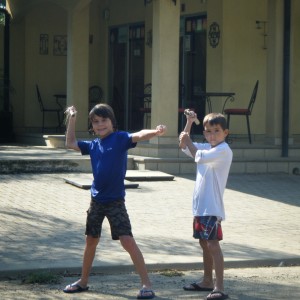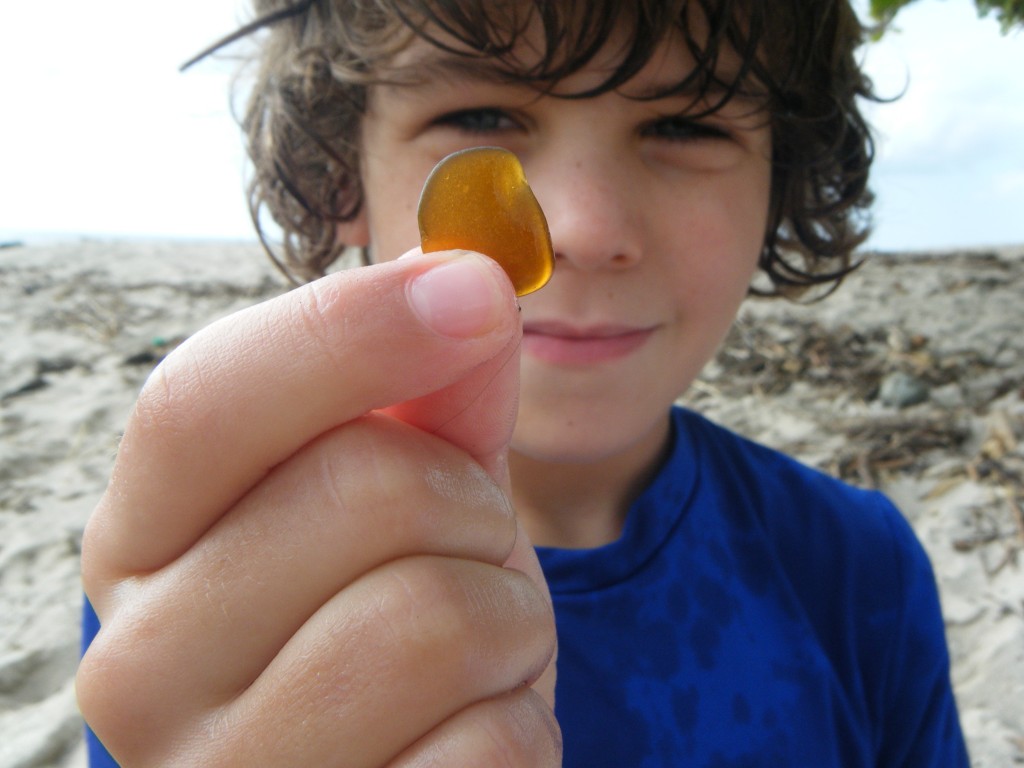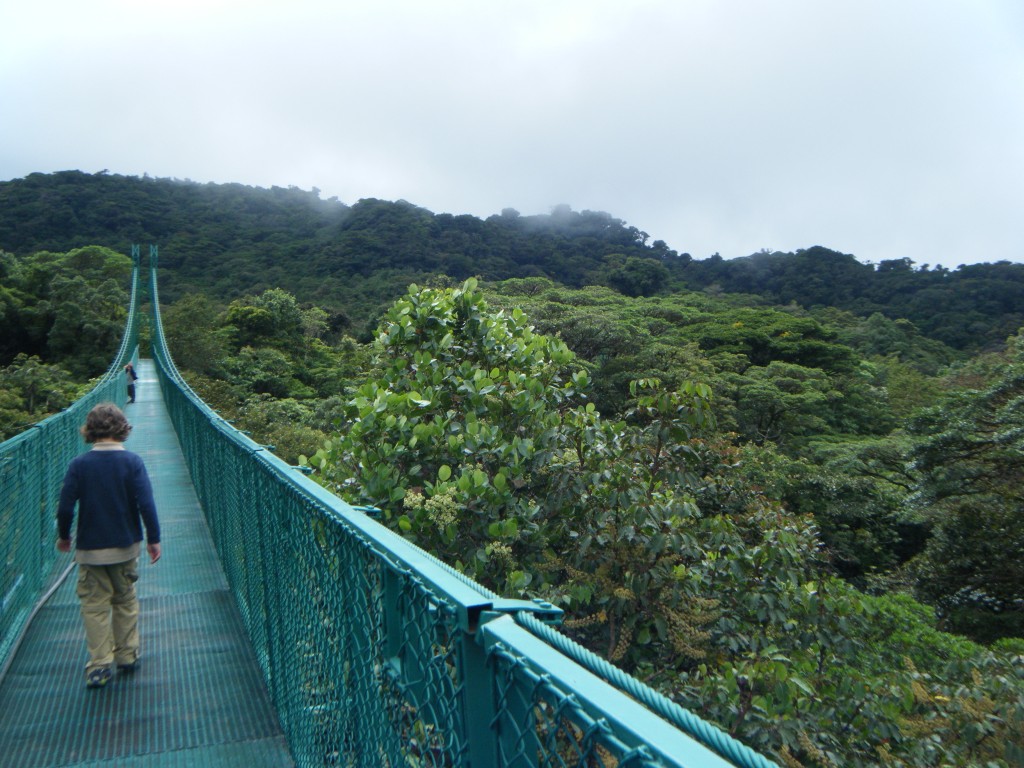
As our time in Central America draws to a close, we’re reflecting on our choice in 2010 to leave institutional schooling for a less structured, more relaxed life as an unschooling family.
What have been the benefits? What have been the drawbacks?
I find that my answers differ from those of the boys. Benefits, to me, have been these:
1. More time spent in one another’s presence. I think that the number of minutes spent together truly means something. The relatively recent, oh-so-North-American notion of “quality time” seems odd to me. So is that of mothers or fathers having to specify a block of time as time in which they will pay special attention to their child. Time is, well, time, and more of it together is just plain good for us, even when the boys look over and see that I am busy editing or writing, or they are watching me volunteer with local learners in Central America.
The boys and I are, quite simply, far more in each other’s day than we were when they attended public school. I never need to ask “How was your day, Sweetheart?” because I saw how their day unfolded. [But I do sometimes ask them this anyway—it’s great to know what impressed them about a particular day’s events.]
2. More opportunities to bond through shared travel, activities, studies, and relaxation. We aren’t just skipping school and leading our same lives in the home we had in the U.S. We have a new setting, new options, and a far smaller circle of friends and acquaintances here. It was nice to see that the boys were well liked in the U.S., but their friends so monopolized their free time that I sometimes just wanted my two kids back. Let me add that the two boys get along far better now than before; neighborhood friends sometimes would pit one boy against the other, which created a lot of family conferences about having your brother’s back. In Central America, we never needed this little reminder.
3. Less taskmastering or “busy work.” We do math exercises, and discuss logical problems. The boys occasionally write in a journal and take photos. But we’re not falling victim to worksheet after worksheet as a manifestation of education. Why does everything have to be so clerically rendered? Discussing things while on a walk is equally instructive. That even goes for me with learning Spanish. I am using far more of an aural/oral approach than choosing to go the route of worksheets…because in the real world, I’ll hear and speak Spanish far, far more than read or write it. So less desk, more motion. Less paper, more discussion.
4. More rest for better family health. Yes, we take life easier, and that begins with our schedule. Hurrying happens less, and when it does, it’s almost an amusing, thrilling change of pace from our norm. We live in a village with practically no shopping, no paved roads, and no expectations for people to hustle. There’s a certain mañana factor going on, and lateness to some event or class is not as heinous or embarrassing as it is up north. So we’re mellower, more rested in our bodies, and we’re healthier for it.
There are drawbacks, too.
1. Feelings of powerlessness. We’re not on our own turf, and it’s palpable. While abroad, we have experienced frustrations with not having a car, with having to walk everywhere in the heat, or the rain and mud. We have been frustrated by the absence of published information about such things as bus schedules, local events, and even the area’s history. It was severely complicated to get a cell phone, so we have gone without, and have relied on e-mail to communicate outside the village, and on the occasional borrowed phone to confirm a departure or appointment (thanks, Yorleny, Drew and Stacy!). We have often not understood local people due to the language barrier, and sometimes also their dialect. We have not been in our home, with its familiar comforts; this rented place with its bare walls, cold showers and critter-infested floors and mattresses has been a far lower standard of living than anything we have ever experienced. In order to economize and have a more authentic Costa Rican experience, we accepted this housing, and this town with its limited amenities, but we sure didn’t enjoy it some of the time—no offense to the many people who love it there, but it would never be our cup of tea long term.
2. Absence of like-minded homeschoolers/unschoolers in the area. We are unique here, gringos who are not enrolled in any school, living in a Costa Rican village whose public school is overcrowded to begin with, and would not have accepted the boys for enrollment. We have never found local families doing homeschool-type enrichment activities with their kids, or taking private classes. [Once we saw a flyer about a ballet class, though. But even with things on offer in the general area, we have been sans automobile, so….] Most of the time, the boys have sought to play with random kids their age at the beach, but this has never been a scheduled event. We’ve had no music lessons, no art, no sports, no drama, no chemistry club or chess club. It’s a far cry from what I would have done to arrange a rich palette of activities up north. You might say, and I might totally agree, that I picked a lemon in bringing us here. But see #4 above. We’ve also not had to play the role of Overscheduled American Minivan Family. Besides, one could argue that we have way too many drawings as it is, and not enough frames to put them in—not to mention no permanent walls to hang them on, since we have our entire household in storage. Which brings me to #3….
3. Missing having a home. Our place was never huge or opulent, but it was somewhere where we could enjoy our kitchen gadgets and utensils for whipping up a meal together. It was a place where we could invite our friends in, maybe change the furniture around once in a while. It was somewhere where we weren’t having to shove things into suitcases to be schlepped out the door and into an idling shuttle van. The boys always wanted a treehouse, and I never gave them one. I could argue that instead, they got a cloud forest in Monteverde, scenes of Brahma cattle grazing in Guanacaste, and bits of seashell under their toenails from the warm Pacific beaches. But they have missed the Pacific Northwest and its facilities. We have all dreamed of a nice home there to come back to.
Now for what the boys have to say. The biggest benefits:
1. Getting to travel. Seeing sloths, seeing baby turtles, being on beaches, seeing volcanoes, going ziplining and on a long waterslide through the jungle, getting to see leaf cutter ants and learn about army ants while looking right at their meters-deep colony. Seeing the world and understanding that in other places, other languages (like Spanish!) are the boss.
2. Not having to do homework or study for state testing.
3. No more cafeteria food. School lunches weren’t always so yummy, and everyone had to be really quiet in the cafeteria or else.
4. Learning about poverty. People are poorer than we are and it makes their life hard.
Drawbacks:
1. Not seeing our friends.
2. Missing Life cereal. Missing Baskin Robbins. Missing Sushi Land.
3. Wondering if we were doing the same hard math that the kids back home were doing. Were they ahead of us at this point?
4. The lower standard of living with its much more uncomfortable housing, fewer selections for meals, no public library, no clubs or activities for kids, streets that were muddy and without sidewalks making for dangerous walking.
I suppose, from seeing these lists, that we could have chosen a far more comfortable, affluent, and literate place to roadschool. Next on our list are Europe and other areas of North America. We’ll file these Costa Rican memories under “What to Try to Do Better for the Next Time” and focus on thinking back on all of the positives we gleaned from the experience.



2. December 2010 at 10:02 am
Really interesting reading your reflections on roadschooling so far. Looking forward to your visit here and meeting the boys.
16. January 2011 at 6:39 pm
I miss Life ceral too and I only live in europe….
27. February 2011 at 12:02 am
Just tuning in to your blog, very interesting stuff. Did you have to do anything official to pull your boys out of the institutions of US education and begin unschooling/roadschooling? I understand the rules differ by states, I just wondered what you had experienced. Also, to follow up on your sons’ observations, DID they end up “behind” in math?
Thanks,
Heidi
1. June 2011 at 3:30 pm
Thanks for writing this! I’m thinking about roadschooling my kids internationally, and it’s very interesting to see your reflection in advance. One of the top places I fantasize about going is a tiny village of 60 people in Northeastern Mexico – it might have some of the same drawbacks as your trip to Costa Rica had! I do love Guanacaste though…